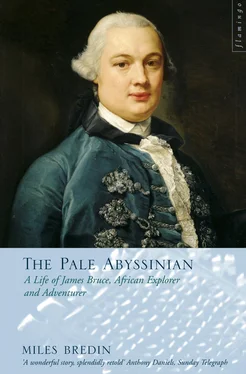
One man was to be the catalyst for Bruce’s new life – the politician, civil servant and former traveller, Robert Wood. Wood had the ear of all the great men of the age. Pitt, Egremont, Halifax, Bute, Grenville and the king himself, all listened to the man who had explored the ruins of Palmyra and Baalbek before going on to forge a brilliant career in the service of the crown. As eighteenth-century political alliances were made and dissolved, as administrations rose and fell, Wood, who purposely avoided great office, was one of the few men who consistently kept close to power. Ministers came and went but he managed to outstay them all until his death in 1771. His first significant job had been as Pitt’s secretary at the Irish office where he soon became known as ‘Mr Pitt’s Wood’, but from there he had moved on to greater things, always managing to keep out of the way when governments fell and always reappearing when the new ones arose. It is not certain how the two men met but, although there are no records of either claim, Wood said that he had been to Harrow and Oxford. Although they were not contemporaries, Harrow may well have been the link between him and Bruce. Wood recognized the spark of talent in the unfulfilled Scot and ensured that it was kindled and fed. It was through Wood’s efforts that Bruce’s abilities were put to more productive use than that of enlightened land owning.
The two were already friends when British relations with Spain declined drastically once more and it occurred to Bruce that the scribblings he had made in Ferrol a few years earlier might be of some use to the country. He formulated a plan for the capture of Ferrol; from this seemingly impregnable port where he had spent a few days with Matthew Stephenson in July 1757, an invasion could be launched. The plan offered two things Bruce sought: advancement and the opportunity to wage war upon a Catholic country. He wrote to Wood and ‘offered to fix an ensign upon the landing place in the first boat that went on shore’.
Wood took the plan from Bruce and arranged an interview with William Pitt. Secretary of State Pitt – who had yet to become either Prime Minister, Chatham, or elderly – was impressed by Bruce but was unable to accept the scheme since war with Spain, let alone invasion of one of its principal ports, was a catastrophe he was then trying to avoid. Already embroiled with Frederick the Great of Prussia against France, Russia and Austria, another front was the last thing he desired. He would, however, take note for the future, he said. France was by now the principal enemy and Spain was becoming of secondary importance.
It must have been a galling time for Bruce; his contemporaries were making names for themselves whilst he had only just managed to extract himself from the wine business in which he was no longer interested. His affairs in Scotland were still not settled to his satisfaction and until that was done he was unable to plan his future. He returned north invigorated by his flirtation with power but still having achieved little. He threw himself into re-organizing the estate, attempting to remove some tenant farmers and coal miners who were spoiling the view from Kinnaird. He had great plans for the house and park so at the same time ensured that the new collieries being planned to supply the Carron Company would not provide additional eyesores.
Months later, he heard from Wood again and was summoned to London. His Ferrol plan was being revived by Pitt but in a modified form that Bruce believed would doom the project to failure. It was intended that the attack on Ferrol should coincide with an invasion of France through Bordeaux. Swiftly, Bruce composed a memorandum in which he begged the government not to pursue such a course. It had some effect and the original plan was once more adopted and championed by Pitt. Ferrol would be invaded as Bruce recommended and an army landed. It was, however, almost immediately abandoned due to objections from the Portuguese ambassador who, as the representative of Britain’s oldest ally, could not be disregarded. Bruce could not understand why he was being consecutively ignored then fêted by the great men of the day and in high dudgeon he decided to return once more to Scotland and find himself a wife. His ego was not the most important casualty of the plan’s rejection: a furious Pitt went to Bath and resigned over the issue.
As Bruce made his preparations to leave, however, one of his conspicuously more successful friends – William Hamilton – contacted him and, acting as Lord Halifax’s secretary, asked Bruce to come and see the great statesman. Hamilton and Bruce had remained friends since Harrow but, while Bruce had battled with illness and spent rather too much time hunting and changing careers, Hamilton had only deviated once. He had trained as a lawyer and then changed course to become a politician. By this time, he even had a nickname – ‘Single Speech’ Hamilton – an epithet he had earned following his spectacular fifteen-hour maiden speech in the House of Commons in 1754. The speech was said to have been written by Samuel Johnson but, since Hamilton rarely spoke in public again, this charge was never proved. His reticence, however, earned for him a great reputation as a thinker, although perversely he also retained his standing as an orator. Hamilton was thus by this time – seven years after the speech – an important player in the corridors of power. (This would be the apex of his career. He would later be described by Lord Charlewood as ‘a man whose talents were equal to every undertaking; and yet from indolence, or from too fastidious vanity, or from what other cause I know not, he has done nothing’.) Lord Halifax sympathized with Bruce – who had wasted much time commuting between Scotland and London only to be left languishing in anterooms by busy ministers – and told the industrious laird that he had work for young men of initiative. Acting under Wood’s influence, Halifax offered Bruce the consulship at Algiers. It was just the kind of employment that he both wanted and needed.
The two men talked long about the possibilities that the posting could offer a man of Bruce’s enterprise. Halifax expected Bruce to perform his consular duties but he also hoped that he would use the post as a platform from which he could explore and record what he saw for the benefit of the new Britain. Robert Wood had discovered and recorded many of the art treasures of the ancient world but there were hundreds of other sites that required classification. Algiers would be the perfect place from which to mount expeditions and his role as consul would give Bruce the authority to travel in style and safety. The menial work, claimed Halifax, would be handled by a vice-consul, who could stamp all the forms and deal with the day-to-day running of the consulate. Then as now, embassies and consulates in Africa were rather more involved in promoting trade than extending the hand of interracial friendship. Someone more knowledgeable would engage in affairs of business whilst Bruce would appear at official functions and travel. Halifax’s plans, however, were foiled and Bruce was compelled to learn the art of diplomacy on the hoof. Algiers was an important, though unprestigious, posting where angering the ruling Dey could result in the enslavement of many British sailors and merchants who sailed in the Mediterranean under a protective treaty with the city state. The Dey was considered little more than a pirate by Britain yet he was in a position to be a serious threat to trade. Bruce would later be condemned for his diplomatic ineptitude although he had been employed for a completely different purpose.
Читать дальше












